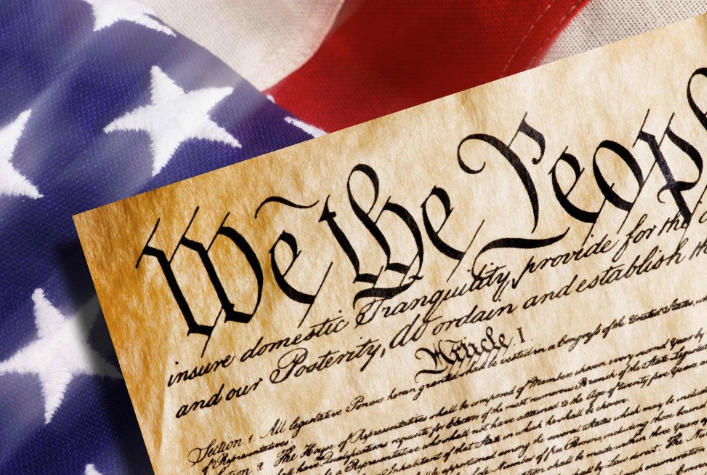By David L. Hudson, Jr.
A retired Air Force Lieutenant Colonel who used the most noxious racial slur at an exchange while shopping had his abusive language conviction reversed by a federal appeals court. The appeals court determined that the conviction could not stand because the government failed to show evidence that the words led to an immediate violent reaction by others. The case is unusual and worth noting because “fighting words” cases are rarely litigated.
The incident occurred in November 2018 when Jules A. Bartow entered the Quantico Marine Corps Exchange to shop for boots. An African-American female employee, Cathy Johnson-Felder, approached Bartow with a normal greeting, “Good morning. May I help you.” For some reason, Bartow replied rudely: “If I had indigestion, diarrhea, or a headache, would you still address me as good morning?”
Bartow then pointed his finger several times at Johnson-Felder. Bartow’s raised voice drew onlookers, including a white uniformed Marine lieutenant colonel who got into a verbal argument with Bartow. A few more people gathered around, including an African-American man in civilian clothes.
Bartow then said, “If I called her a [the N-word], would she still say good morning?” It was unclear whether Bartow directed this at the white lieutenant colonel or the African-American man.
A store security guard escorted Bartow out the store and base security officers arrested him. He was charged with violating a Virginia law prohibiting abusive language. The law provides:
“If any person shall, in the presence or hearing of another, curse or abuse such other person, or use any violent abusive language to such person concerning himself or any of his relations, or otherwise use such language, under circumstances reasonably calculated to provoke a breach of the peace, he shall be guilty of a Class 3 misdemeanor.”
The case proceeded to trial before a magistrate who found Bartow guilty and fined him $500. A federal district court affirmed.
On appeal, a three-judge panel of the Fourth U.S. Circuit Court of Appeals reversed in the lower court’s decision in U.S. v. Bartow, reasoning that the government failed to show the abusive language led to immediate violence.
The appeals court had little trouble finding that Bartow had uttered abusive language. “It is hard to think of an English term that is more abhorrent,” Judge Diana Gribbon Motz wrote for the panel. “Indeed, this epithet is so loaded with a legacy of slavery and racial hatred that it is inextricably linked with prejudice and hostility toward African-Americans.”
The court reasoned, however, that the utterance of the noxious racial slur alone could not be criminalized under the Supreme Court’s “fighting words” jurisprudence. The Court created the fighting words exception in Chaplinsky v. New Hampshire (1942), defining these as “words which by their very utterance inflict injury or cause an immediate breach of the peace.”
However, the Court has significantly narrowed the fighting words doctrine through the years such that it generally is applied only to direct, face-to-face personal insults that would tend to lead to violence. Motz writes that “the Court has effectively eliminated the ‘inflict injury’ prong of the ‘fighting words’ analysis.”
Faced with these limitations, the Fourth Circuit focused on the government’s failure to prove that the slur led to a violent reaction. “The Government offered no evidence that either [the white lieutenant colonel or the African-American man in civilian clothes] actually reacted violently to Bartow’s hateful slur or that a reasonable person in their positions would have done so,” Motz wrote.
The appeals court concluded that it must follow the constitutional limitations on the fighting words doctrine “even if that means, as it does here, that shameful speech escapes criminal sanction.”
The Fourth Circuit’s decision shows it is difficult to convict someone for their abusive speech, because the fighting words doctrine has been narrowed. Most often people are prosecuted under disorderly conduct statutes or ordinances and prosecutors will often emphasize the unruly conduct of the person such as shaking their fist or engaging in physical contact —rather than focus solely on the speech itself.
In its opinion, the Fourth Circuit noted that the U.S. Supreme Court has not affirmed a single conviction in a fighting words case since Chaplinsky. What the court did not discuss at much length is that the fighting words doctrine is still a real force in lower state court cases.
As I explain in my University of New Hampshire Law Review piece,“The Fighting Words Doctrine: Alive and Well in the Lower Courts,” at least some state appellate courts still affirm fighting words-types of convictions. I explain: “courts that affirm a disorderly conduct or breach of the peace conviction are more likely to emphasize a defendant’s aggressive conduct, a defendant’s loud volume, the repeated profanities of the defendant, the reaction of the recipient of the communication, and noxious racial slurs.”
David L. Hudson, Jr. is an assistant professor of law at Belmont University College of Law, and the author of First Amendment: Freedom of Speech (2012). He is also a legal fellow at First Amendment Watch.
Tags


